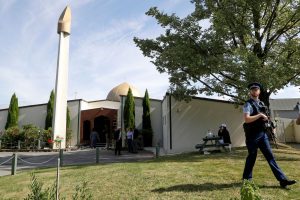WELLINGTON, New Zealand (AP) — New Zealand’s government will end the involvement of police officers in regulating gun ownership, an official said Tuesday as she announced sweeping firearms law reforms.
The move is intended to ease tensions between the gun regulator and firearms owners, which have been fraught since the agency’s creation following a shooting massacre at two New Zealand mosques.
The Firearms Safety Authority has overseen gun ownership since 2022 after an inquiry underlined the way the white supremacist attacker legally acquired numerous weapons without attracting law enforcement scrutiny.
Near-total ban on semiautomatics to stay
The changes unveiled in Wellington by Associate Justice Minister Nicole McKee stopped short of what the police union and those bereaved in the Christchurch massacre feared: a reversal of the near-complete ban on semiautomatic firearms passed after the attacker killed 51 Muslims at prayer on March 15, 2019.
McKee, a lobbyist for gun owners before she entered parliament in 2020, told reporters her bid to relax the semiautomatic weapons ban for some sports shooters wasn’t approved by the Cabinet. Her government had refused to rule out reversing the ban before.
Instead, her changes focused on removing uniformed officers from the regulatory body and altering its oversight. Once McKee’s law passes, the authority will report directly to the government, rather than the head of the New Zealand Police.
Law will remove police from gun licensing
“There will be no blue shirts in the Firearms Safety Authority,” McKee said, referring to police uniforms. The 15 officers who worked at the authority would return to police duties, which will still include enforcing gun crime laws.
“We need to rebuild the trust and confidence between the regulator and the licensed firearms community that has diminished severely over the past six years,” said McKee. She said “a lot of the blame” for the Christchurch attack was directed at gun owners, who say police should be focusing on law enforcement, not on regulation compliance or licensing.
The regulator is currently a unit within the police department. The law change would create a more independent legal structure that would only share corporate services with the law enforcement agency.
The body couldn’t be entirely separated from the police department due to a reliance on law enforcement databases, McKee said.
Measures revise law changes that followed attack
The Australian attacker, who moved to New Zealand to carry out the massacre, was granted a license and legally amassed semiautomatic weapons after being radicalized online. Lawmakers changed the rules after the attack to require more information from applicants, such as travel histories, and tighter policies about character referees which might have raised questions when Brenton Tarrant applied for a license.
Tarrant pleaded guilty in 2020 to a terrorism charge, 51 counts of murder and 37 of attempted murder. He was sentenced to life in prison without parole.
“None of us want to see that again,” McKee said. But she said the swift changes in the attack’s aftermath were “rushed, confused and unfair.”
New Zealand drew global admiration when its then-Prime Minister Jacinda Ardern said six days after the massacre that the weapons used would be banned. Further reforms included new gun club rules and a firearms registry.
Changes focus on clarity, associate justice minister says
McKee, who opposed most of the changes as a lobbyist, left many untouched in the law rewrite. She said the focus was on simplifying regulations so law-abiding gun owners could comply more easily.
That included extending renewal windows for licenses, which sometimes lapse due to backlogs, and allowing more flexibility in where licensed gun owners can store their weapons. The small number of New Zealanders permitted semiautomatic weapons for pest control will be allowed to hold their licenses for longer.
The new law would also introduce a so-called red flag system enabling other government agencies to share information with the regulator. It would strengthen controls on 3D-printed gun manufacturing, though it stops short of what police had urged.
The legislation replacing the Arms Act was still being drafted and wasn’t publicly available Tuesday. McKee said it would be introduced to Parliament before year’s end and she hoped it would pass by mid-2026. Her libertarian party, Act, is part of a three-party, center-right coalition government that has enough lawmakers to pass the reforms outright.
Gun owners cautiously pleased
A spokesperson for the Council of Licensed Firearms Owners, which McKee previously led, said the group welcomed the removal of police from gun licensing. Hugh Devereux-Mack said the structure of the regulator had resulted in “unfair and intimidating treatment” of gun owners.
Devereux-Mack said he was disappointed the law didn’t propose a new definition of who qualifies as a “fit and proper” person to own a gun. He urged gun owners to make submissions on the bill before it passed.
By CHARLOTTE GRAHAM-McLAY
Associated Press


